#Cloud CRM software
Explore tagged Tumblr posts
Text
GST Billing Software for Winery: A Modern Solution for Smooth Business
Operations
A winery manager must manage production, sales, supply, and finances. Keeping organized is challenging when GST laws change often. GST billing software simplifies compliance, billing, and taxes for wineries. This lets vineyard owners and managers focus on developing exceptional wine and improving customer service. Wineries may address these issues using VERgo ERP, which streamlines daily processes. Benefits of Using GST Billing Software for Winery
Centralisation of All Information Wineries include production, sales, marketing, and bookkeeping. Managing these duties independently might lead to data inconsistency, confusion, and errors. GST accounting software centralizes data. One spot has all the information you need to monitor items, conduct client sales, and calculate GST. With a central data system, your team can collaborate better. It eliminates several systems, reducing human labour and errors.
Efficiency Gain Repeating tasks would be complex without GST billing instruments. Every sale gets automatic billing, real-time tax calculations, and inventory updates. This saves your workers time when manually entering data. Automation reduces human errors for more accurate records and speedier order processing. A better-organized firm allows your staff to focus on growth- promoting activities like marketing and client engagement.
Traceability of Information Traceability is crucial in the wine industry, whether tracking grapes, production batches, or product quality. GST monitoring software enables you to track your wine throughout its life, making it easy to trace. Connect sales, supply, and manufacturing figures to clarify. This makes recalls and other issues easier to address and offers you peace of mind, knowing you can immediately obtain the information you need.
Regulatory Compliance Wineries must follow GST laws wherever they sell. GST billing software automatically adds tax rates to sales, making this easy. This ensures you obey current tax laws. The application generates GST-compliant invoices and tax data. Because tax tasks are easier and faster, not worrying about fines or reports is greater.
Cloud Availability
Cloud-based GST payment software securely stores your data online for easy access. This is helpful for multi-location farms and remote teams. Cloud access ensures that your machine gets the latest software updates and your data is secure from local calamities like hardware failures. How VERgo ERP Helps You An all-in-one system, VERgo ERP simplifies farm management. Its centralized data administration, computerized billing, and real-time tax estimations simplify manual duties. It also simplifies inventory management and shows stock levels at all times. VERgo ERP produces GST-compliant bills and reports, making tax compliance easy. Different vineyard groups may easily collaborate using VERgo ERP's project management solutions. This ensures manufacturing, marketing, and sales cooperate. The cloud-based software enables you to access data from any device, offering flexibility and convenience. Tracking and mass messaging options in VERgo ERP increase customer relationship management. This helps wineries quickly contact clients, give promotions, and promote new wine batches and events. Conclusion Winery operations are challenging to manage, especially with GST and regulations. GST billing software like VERgo ERP may improve productivity, tracking, and compliance for your vineyard. With online access and centralized data, VERgo ERP helps your vineyard function smoothly, make fewer mistakes, and focus on growth. VERgo ERP is ideal for boutique farms and large productions since it simplifies business operations.
#CRM Software#Best CRM Software#best crm software in india#Cloud CRM software#Best Cloud CRM software#Cloud CRM software in India#best SaaS crm software#best SaaS management software
1 note
·
View note
Text
How Cloud CRM Software Improves Remote Team Collaboration
With the rise of remote work, businesses are increasingly reliant on tools that facilitate collaboration, communication, and productivity. One tool that has proven invaluable is Cloud CRM Software. But how exactly does it improve remote team collaboration, especially for small businesses? Let’s explore how leveraging this technology enhances connectivity, accountability, and overall team efficiency.
What Makes Cloud CRM Essential for Small Businesses?
As small businesses grow, managing customer relationships becomes more complex. Enter CRM Software for Small Business. Cloud-based solutions allow teams to access critical customer data from any location, enabling seamless collaboration across various time zones. This accessibility is a game changer for remote teams.

But how does it specifically help with collaboration? Let’s break it down.
Real-Time Data Access
Imagine a remote team spread across different continents. Without a centralized system, sharing customer data or tracking updates becomes inefficient. Cloud CRM Software allows real-time access to updated customer information. No more sifting through long email threads or asking colleagues for the latest client details.
For example, Commence CRM offers a cloud solution that provides up-to-date customer interactions, purchase history, and communication logs all in one place. This means no team member is left out of the loop, fostering collaboration and smoother project execution.
Task Management and Accountability
One of the biggest challenges in remote work is managing tasks and ensuring accountability. Cloud CRM Software comes equipped with task management features that assign tasks, set deadlines, and monitor progress.
In fact, according to a study by Gallup, companies with engaged and collaborative teams are 21% more profitable than those without. By providing a clear view of who is responsible for what, team members can collaborate more effectively, avoiding miscommunication.
Example: In Commence CRM, you can set up tasks for individual team members with automated reminders. This helps remote teams stay on track, ensuring nothing falls through the cracks.

Enhanced Communication Channels
Effective communication is the backbone of any successful remote team. Cloud CRM Software typically offers integrated communication tools, such as messaging, video calls, and email tracking. This keeps everyone connected and ensures that important updates are shared instantly.
Scenario: Let’s say your sales team is working remotely and needs to collaborate on a client proposal. Through Commence CRM, they can share notes, updates, and even initiate calls from within the system. No need for third-party apps—everything is housed under one roof.
Better Customer Experience
Your remote team may be scattered across the globe, but your customers expect seamless service. Cloud CRM Software ensures that your team has access to the same customer information, which leads to more personalized interactions and faster response times.
Customers don’t have to explain their needs multiple times to different team members. As soon as they contact your business, whoever they speak with can immediately access their history and pick up right where the previous interaction left off.
Data Security and Compliance
Data security is a concern for many businesses, especially when operating remotely. A robust Cloud CRM Software will not only offer seamless access but also ensure that sensitive customer data is protected through encryption and secure cloud storage.
Commence CRM prioritizes data security, offering encryption protocols and compliance measures that ensure your customer data is secure, even with a dispersed team.
0 notes
Text
#Best property listing software in UAE#Real estate listing software for UAE agents#Cloud-based property management software UAE#UAE real estate software for brokers and agents#Property listing and CRM software in UAE
2 notes
·
View notes
Text
What is ERP and Why Your Small Business Needs It?
Running a small business is a challenging but rewarding endeavor. You wear many hats, juggle countless tasks, and constantly strive for growth. But as your business expands, managing everything with spreadsheets and disconnected software can become a major bottleneck. That's where Enterprise Resource Planning (ERP) systems come in.
What Exactly is an ERP?
Think of an ERP system as the central nervous system of your business. It's a type of software that integrates all your core business processes into a single, unified platform. This means your sales, inventory, accounting, human resources, and other departments can all access and share the same data in real-time.... Read More
#coquicloud#business#businesstips#entrepreneurs#odoo#technologies#techtips#software#saas#small business#business management#business consulting#efficiency#innovation#digitaltransformation#technologynews#productivitytips#cloud solutions#Coqui Cloud#Latino Businesses#Odoo Implementation#technews#Odoo Support#business automation#CRM#Accounting#Inventory Management
3 notes
·
View notes
Text
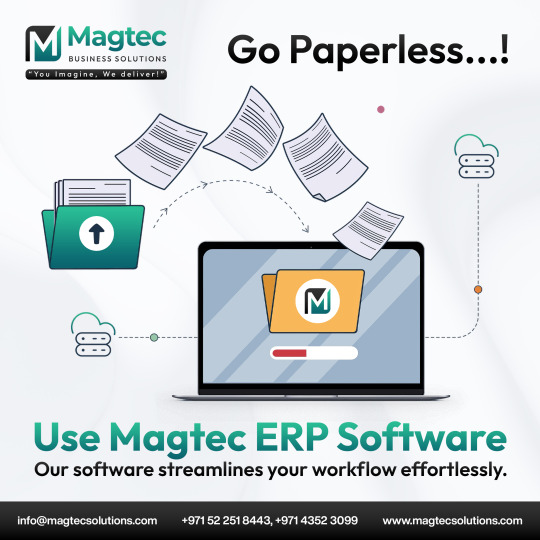
Tired of paper piles? 🚫 Go paperless with Magtec ERP Software! 💻 Streamline your workflow and boost efficiency. It's time to embrace the digital future.
#erp#business#software#management#automation#enterprise#resources#planning#solution#system#cloud#industry#finance#accounting#supplychain#inventory#crm#hr#manufacturing#distribution#retail#healthcare#education#hospitality#smallbusiness#mediumenterprise#largeenterprise#magtecerp#magtec#magtecsolutions
3 notes
·
View notes
Text
youtube
Welcome to an enlightening keynote presentation on the game-changing synergy between Artificial Intelligence (AI) and Enterprise Resource Planning (ERP), delivered by a seasoned Project Manager with a wealth of industry experience.
Read More: What Are The Benefits Of ERP System?
#erpsolution#AIinerp#braincavesoft#erp#software#business#erpsoftware#technology#crm#sap#erpsystem#erpsolutions#ecommerce#accounting#ocd#cloud#clouderp#saphana#sapbusinessone#dynamics#finance#tecnologia#education#management#marketing#Youtube
2 notes
·
View notes
Text
#erp software#cloud erp#erp application#erp consulting services#erp development company#erp development services#erp for small business#erp system#erp integration#crm software#erp for manufacturing
1 note
·
View note
Text
How Businesses Are Leveraging Power BI Cloud for CRM Success
In today’s data-driven world, businesses are constantly seeking ways to enhance customer relationship management (CRM) and make informed decisions. One of the most powerful tools that has emerged in recent years is Power BI Cloud. By integrating this advanced analytics platform with CRM software, businesses can unlock valuable insights, improve customer engagement, and drive growth.
Understanding Power BI Cloud and Its Role in CRM
Power BI Cloud is a business intelligence tool that enables companies to visualize and analyze data in real time. With its cloud-based functionality, businesses can access reports and dashboards from anywhere, making data-driven decision-making more efficient and accessible. When integrated with CRM software, Power BI Cloud allows businesses to track customer interactions, sales performance, and marketing effectiveness with ease.
Benefits of Using Power BI Cloud for CRM Success
1. Enhanced Data Visualization
Power BI Cloud transforms raw data into interactive dashboards and reports. Businesses can gain a comprehensive view of their customer interactions, sales pipeline, and overall performance, helping them identify trends and make informed decisions.
2. Real-Time Data Analysis
Unlike traditional reporting tools, Power BI Cloud provides real-time analytics, allowing businesses to monitor their CRM software metrics on the go. This ensures that decision-makers always have up-to-date information to optimize their strategies.
3. Improved Customer Insights
By analyzing customer behavior and preferences, businesses can create personalized marketing campaigns and improve customer engagement. Power BI Cloud’s data visualization capabilities make it easier to segment customers based on their interactions with the company.
4. Seamless CRM Software Integration
Power BI Cloud integrates seamlessly with popular CRM software, including Microsoft Dynamics 365, Salesforce, and HubSpot. This integration allows businesses to consolidate their data, reducing manual efforts and improving efficiency.
5. Better Decision-Making for Sales and Marketing Teams
With Power BI Cloud, sales and marketing teams can gain deeper insights into customer journeys, sales performance, and conversion rates. This enables them to refine their strategies and enhance overall business performance.
Power BI Cloud in CRM Software Development
For companies involved in CRM software development, Power BI Cloud offers advanced analytics and reporting features that enhance the overall functionality of the software. Developers can integrate Power BI dashboards directly into CRM platforms, allowing businesses to leverage powerful data analytics without the need for additional tools.
Conclusion
Power BI Cloud is revolutionizing the way businesses use CRM software by providing real-time insights, interactive dashboards, and seamless integration. Whether you're a small business or a large enterprise, leveraging Power BI Cloud can enhance customer relationship management, drive sales, and improve decision-making. If you haven’t already, it’s time to explore the potential of Power BI Cloud for your CRM strategy.
Would you like assistance in integrating Power BI Cloud with your CRM software? Contact us today to learn more!
0 notes
Text

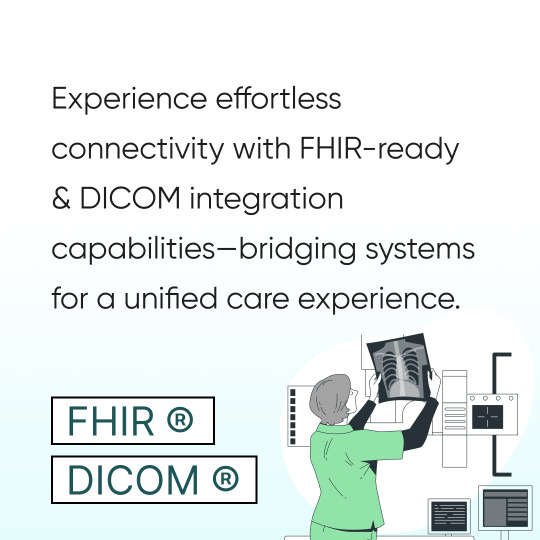
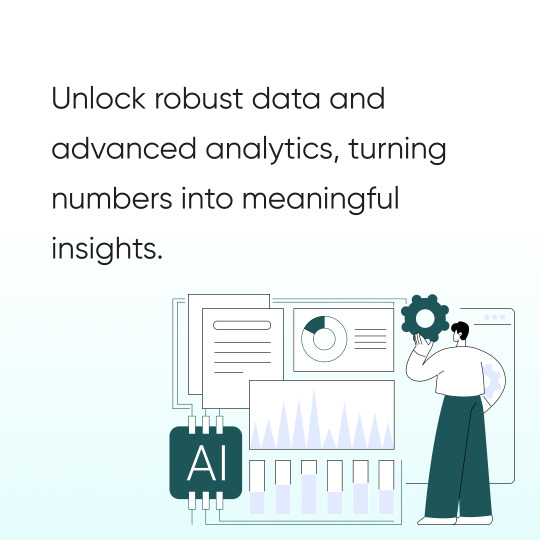
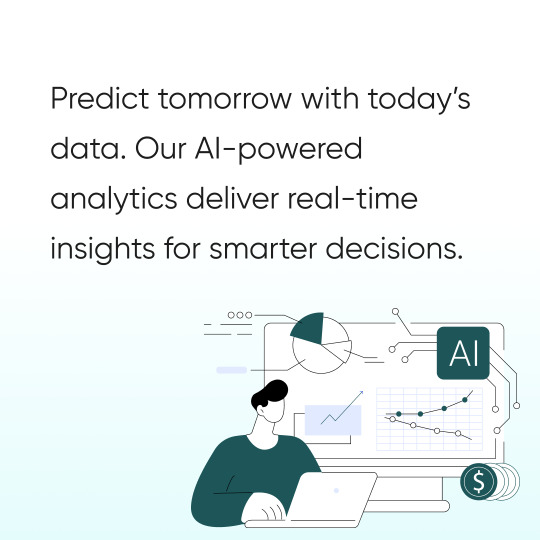

Empower Your Practice with Secure, Interoperable, Intelligent health cloud technology. Enable transformation with cost-effective solutions, meticulously designed for healthcare—innovation that works for you.
#ophthalmology#ehr#emr#practice management software#medical practice management software#healthcare crm#ophthalmology ehr emr software#clouds#cloud hr software
0 notes
Text
#Restaurant mobile app development#restaurant billing system#restaurant billing software#Inspire Software Co.#Hotel billing software#Hotel property management system#Event booking software#Event booking CRM#Billing software for restaurant#Billing software for Hotel#Best restaurant POS system#Banquet hall management software#Banquet CRM software#Banquet software solutions#Cloud POS for restaurants#Inventory management for restaurants
1 note
·
View note
Text
1 note
·
View note
Text
Boost Your Business with Sales and Lead CRM Management Software Quick Demo - Rocket Singh Software
In today’s competitive business landscape, managing sales leads efficiently is crucial for success. Rocket Singh Software offers one of the best Sales Lead CRM Management software, designed to streamline lead tracking, enhance customer interactions, and boost sales conversions. If you're looking for a quick demo of this powerful CRM software, this blog will walk you through its key features and benefits.
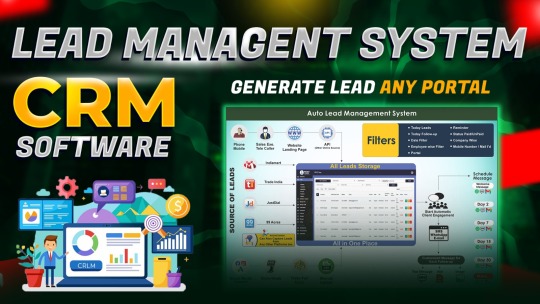
What is Lead Management?
Lead management software is the process of capturing, tracking, and nurturing potential customers until they convert into paying clients. A well-structured lead management system ensures that no opportunity slips through the cracks and helps sales teams maximize their efficiency.
Key Features of Rocket Singh CRM Software for Lead Management:
Automated Lead Capture: Seamlessly collect leads from multiple sources, including websites, social media, and emails.
Lead Scoring & Qualification: Prioritize high-quality leads based on predefined criteria.
Lead Assignment & Tracking: Distribute leads among sales representatives for efficient follow-ups.
Lead Nurturing & Engagement: Automated follow-up emails and reminders to keep prospects engaged.
Analytics & Reporting: Gain insights into lead conversion rates and optimize sales strategies.
What is Sales Management?
Sales management software involves overseeing and guiding the sales process to improve revenue generation and customer relationships. A comprehensive CRM system like Rocket Singh helps streamline sales operations, making them more effective and data-driven.
Key Features of Rocket Singh CRM Software for Sales Management:
Sales Pipeline Management: Visualize the sales funnel and track progress at every stage.
Automated Workflow: Reduce manual tasks with automated follow-ups, notifications, and approvals.
Customer Interaction History: Maintain detailed records of interactions with prospects and customers.
Task & Appointment Scheduling: Organize meetings, calls, and follow-ups efficiently.
Performance Analytics: Monitor team performance and sales trends with real-time reports.
Why Choose Rocket Singh Software for Sales Lead Management?
1. Seamless Lead Capture & Tracking
Automatically capture leads from multiple sources, including websites, emails, and social media.
Assign leads to the right sales representatives for efficient follow-ups.
Monitor lead progress in real time with a centralized dashboard.
2. Automated Sales Workflow
Set up automated follow-ups, reminders, and task assignments.
Reduce manual data entry and let automation take care of repetitive tasks.
Customize sales workflows to match your business needs.
3. Powerful Analytics & Reporting
Gain valuable insights with data-driven reports on sales performance and lead conversion.
Track KPIs to optimize sales strategies.
Generate real-time analytics for data-backed decision-making.
4. Quick Demo: Experience Rocket Singh CRM in Action
If you want to see how Rocket Singh Software can transform your best Sales Lead CRM Management software process, request a quick demo today. The demo will showcase:
A user-friendly interface with easy navigation.
Step-by-step lead management workflows.
Integration with marketing and customer service tools.
Conclusion
Effective best Sales Lead CRM Management software is crucial for business growth, and Rocket Singh CRM software provides a comprehensive solution to streamline these processes. By leveraging its powerful features, businesses can enhance productivity, improve customer engagement, and boost sales conversions.
If you're looking to transform your sales strategy, consider adopting Rocket Singh CRM and take your business to new heights!
More Information:
📞 Contact us at 7600863111
Visit: myrocketsingh.com
Follow us: @Rocketsingh
#Best Sales Lead CRM Software#Top CRM for Lead Management#Sales CRM Software Solutions#CRM for Lead Tracking#Lead Management CRM Tools#CRM for Sales Leads#Sales Lead Tracking Software#Best Lead Management CRM#CRM Software for Sales Teams#Automated Sales Lead CRM#Sales CRM & Lead Management#Cloud-Based Lead CRM#CRM for Lead Generation#Sales & Lead Tracking CRM#Lead Conversion CRM Software#CRM Solutions for Sales Leads#Best CRM for Sales Pipelines#AI-Powered Lead CRM#Small Business Sales CRM#CRM for Lead Nurturing
0 notes
Text
A cloud-based ERP system (Enterprise Resource Planning) is a software solution that integrates various business processes into one unified system. It manages core business activities such as finance, human resources, inventory management, procurement, and customer relationship management (CRM) through a central database. The cloud aspect means the system is hosted remotely on servers, and users can access it through the internet, rather than installing and maintaining hardware on-site.
Read more:
0 notes
Text

https://flowrocket.com/people-culture
Attendance Tracking Software, Cloud-Based HRMS & CRM for HR in the USA | FlowRocket
0 notes
Text
youtube
Best Software Development Company in Bangladesh | Smart Software Limited
#best software development company in bangladesh#Top Software Developers in Bangladesh#SoftwareSolutions#ITCompany#Top Software Companies in Bangladesh#Software Development Services in Bangladesh#Custom Software Development Bangladesh#IT Company in Bangladesh#Software Solutions Provider in Bangladesh#ERP Software Development in Bangladesh#Mobile App Development in Bangladesh#CRM and HRM Software#Web Application#Cloud Software Development#Youtube
0 notes